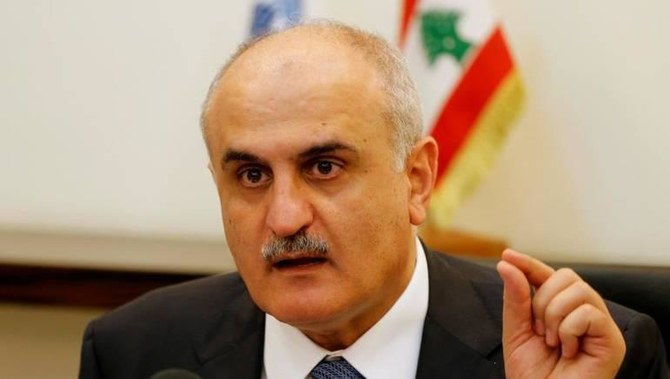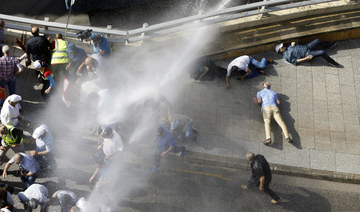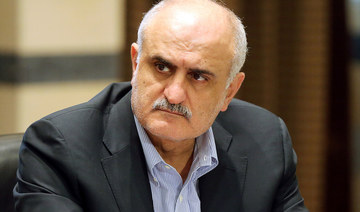BEIRUT: The heavily indebted Lebanese government approved a draft budget to cut its large deficit on Friday, aiming to ward off a financial crisis which top leaders have warned is bearing down on the country unless it carries out reforms.
The draft 2019 budget, which will cut the deficit to 7.5% of GDP from 11.5% in 2018, is seen as a critical test of the government's will to launch reforms that have been put off for years by a state riddled with corruption and waste.
Lebanon's bloated public sector is its biggest expense, followed by the cost of servicing a public debt equal to some 150% of GDP, one of the world's heaviest debt burdens.
The budget could help unlock some $11 billion in financing pledged at a Paris donors' conference last year for infrastructure investment, if it wins the approval of donor countries and institutions.
"Now, praise God, we are done. The budget is complete," Information Minister Jamal Jarrah said after a cabinet session.
One more meeting to seal the process will be held at the presidential palace before the draft is referred to parliament for approval. Ministers did not say when the next session would take place.
Fears the budget would lead to cuts to state salaries, pensions or benefits triggered weeks of strikes and protests by public sector workers and military veterans.
Measures to rein in the public sector wage bill include a three-year freeze in all types of state hiring and a cap on extra-salary bonuses. State pension will also be taxed.
However a temporary public sector salary cut mooted by some early in the process was not included.
A big chunk of the deficit cut stems from tax increases including a 2% import tax and a hike in tax on interest payments. The government also plans to cut some $660 million from the debt servicing bill by issuing treasury bonds at 1% interest rate to the Lebanese banking sector.
The final cabinet approval had been obstructed by a dispute over whether more needed to be done to bring the deficit lower.
But Finance Minister Ali Hassan Khalil, speaking to local media, said "all the clauses and articles" had been agreed. Nobody had raised any objections when Prime Minister Saad al-Hariri said "we are done" at the end of the session, he added.
There was no immediate comment from Foreign Minister Gebran Bassil, who had been demanding further debate.
Deputy Prime Minister Ghassan Hasbani, speaking to Reuters on Thursday, said the draft budget would stabilise the financial situation and avoid "catastrophe" but it fell short of the major structural reforms Lebanon needs.
Economists in Lebanon say it will give a "positive shock" to market confidence against a backdrop of years of low economic growth, concern over a slowdown in the growth of bank deposits and falling central bank net foreign assets.
Aberdeen Standard Investments emerging markets fund manager Kevin Daly said: "We are still sceptical because they still have very little room in the budget." Wages and subsidies made up a large proportion of the deficit, he noted.
"I think the market will come back after the weekend and take a closer look ... the jury is still out on these guys".
Nassib Ghobril, chief economist at Lebanon's Byblos Bank, said the draft budget had stopped increases in government spending but had not reduced them.
"They might reduce the deficit to an acceptable level. But it is not a reform budget or an austerity budget, it is a budget based heavily on taxes," he said.
"This is the easy way out for the government to reduce the deficit. If we believe the figure, it is a significant reduction in the deficit, but it is not the way to do it in a stagnating economy, in an economy in need of liquidity."
Jason Tuvey, senior emerging markets economist at Capital Economics, said: "Markets might react positively initially in as far as they've actually managed to agree on a budget after several weeks of deliberations.
"But over longer horizon, we still think that markets in Lebanon will come under pressure again."
Lebanese cabinet approves draft state budget
Lebanese cabinet approves draft state budget

- Budget is seen as a critical test of the government's determination to make changes
- Could help unlock some $11 billion in financing
Rafah incursion would put hundreds of thousands of lives at risk, UN aid agency says

- Leaders internationally have urged Israeli Prime Minister Benjamin Netanyahu to be cautious
- US Defense Secretary Lloyd Austin said any US response to incursion would be up to President Biden
GAZA: The United Nations humanitarian aid agency says hundreds of thousands of people would be “at imminent risk of death” if Israel carries out a military assault in the southern Gaza city of Rafah.
The city has become critical for humanitarian aid and is highly concentrated with displaced Palestinians.
Leaders internationally have urged Israeli Prime Minister Benjamin Netanyahu to be cautious about any incursion into Rafah, where seven people — mostly children — were killed overnight in an Israeli airstrike.
On Thursday, US Defense Secretary Lloyd Austin said any US response to such an incursion would be up to President Joe Biden, but that currently, “conditions are not favorable to any kind of operation.”
Turkiye’s trade minister said Friday that its new trade ban on Israel was in response to “the deterioration and aggravation of the situation in Rafah.”
The Israel-Hamas war has driven around 80 percent of Gaza’s population of 2.3 million from their homes, caused vast destruction in several towns and cities, and pushed northern Gaza to the brink of famine.
The death toll in Gaza has soared to more than 34,500 people, according to local health officials, and the territory’s entire population has been driven into a humanitarian catastrophe.
The war began Oct. 7 when Hamas attacked southern Israel, abducting about 250 people and killing around 1,200, mostly civilians. Israel says militants still hold around 100 hostages and the remains of more than 30 others.
Dozens of people demonstrated Thursday night outside Israel’s military headquarters in Tel Aviv, demanding a deal to release the hostages. Meanwhile, Hamas said it would send a delegation to Cairo as soon as possible to keep working on ceasefire talks. A leaked truce proposal hints at compromises by both sides after months of talks languishing in a stalemate.
Across the US, tent encampments and demonstrations against the Israel-Hamas war have spread across university campuses.
More than 2,000 protesters have been arrested over the past two weeks as students rally against the war’s death toll and call for universities to separate themselves from any companies that are advancing Israel’s military efforts in Gaza.
Iraqi militant group claims missile attack on Tel Aviv targets, source says

- The attack was carried out with multiple Arqub-type cruise missiles
BAGHDAD: The Islamic Resistance in Iraq, a group of Iran-backed armed groups, launched multiple attacks on Israel using cruise missiles on Thursday, a source in the group said.
The source told Reuters the attack was carried out with multiple Arqub-type cruise missiles and targeted the Israeli city of Tel Aviv for the first time.
The Islamic Resistance in Iraq has claimed dozens of rockets and drone attacks on US forces in Iraq and Syria and on targets in Israel in the more than six months since the Israel-Hamas war erupted on Oct. 7.
Israel has not publicly commented on the attacks claimed by Iraqi armed groups.
15 pro-government Syrian fighters killed in Daesh attacks: monitor

- It is the latest attack of its kind by remnants of the jihadists
BEIRUT: Daesh group militants killed at least 15 Syrian pro-government fighters on Friday after they attacked three military positions in the Syrian desert, a war monitor said.
It is the latest attack of its kind by remnants of the jihadists.
They “attacked three military sites belonging to regime forces and fighters loyal to them... in the eastern Homs countryside, triggering armed clashes... and killing 15” pro-government fighters, the British-based Syrian Observatory for Human Rights said.
Daesh overran large swathes of Syria and Iraq in 2014, proclaiming a so-called caliphate and launching a reign of terror.
It was defeated territorially in Syria in 2019, but its remnants continue to carry out deadly attacks, particularly against pro-government forces and Kurdish-led fighters in the vast desert.
Daesh remnants are also active in neighboring Iraq.
Last month, Daesh fighters killed 28 Syrian soldiers and affiliated pro-government forces in two attacks on government-held areas of Syria, the Observatory said.
Many were members of the Quds Brigade, a group comprising Palestinian fighters that has received support from Damascus ally Moscow in recent years, according to the Observatory, which has a network of sources inside Syria.
In one of those attacks, the jihadists fired on a military bus in eastern Homs province, the Observatory said at the time.
Separately, six Syrian soldiers died in an Daesh attack against a base in eastern Syria, it added.
Syria’s war has claimed the lives of more than half a million people and displaced millions more since it erupted in March 2011 with Damascus’s brutal repression of anti-government protests.
It then pulled in foreign powers, militias and jihadists.
In late March, Daesh militants “executed” eight Syrian soldiers after an ambush, the monitor said at that time.
The jihadists also target people hunting desert truffles, a delicacy which can fetch high prices in the war-battered economy.
The Observatory in March said Daesh had killed at least 11 truffle hunters by detonating a bomb as their car passed in the desert of Raqqa province in northern Syria.
In separate unrest in the country, Syria’s defense ministry earlier on Friday said eight soldiers had been injured in Israeli air strikes near Damascus.
The Observatory said Israel had struck a government building in the Damascus countryside that has been used by Lebanon’s Iran-backed Hezbollah group since 2014.
The Israeli military has carried out hundreds of strikes in Syria since the outbreak of Syria’s civil war, mainly targeting army positions and Iran-backed fighters.
Prominent Gaza doctor killed by torture in Israeli detention

- Al-Bursh died in Ofer Prison, an Israeli-run incarceration facility in the West Bank, says the Palestinian Prisoners Society
GAZA: Adnan Al-Bursh, a Palestinian surgeon and former head of orthopedics at Gaza’s Al-Shifa medical complex, was killed on April 19 under torture in Israeli detention.
According to a statement from the Palestinian Prisoners Society, Al-Bursh, 50, died in Ofer Prison, an Israeli-run incarceration facility in the West Bank.
His body remains held by the Israeli authorities, according to the Palestinian Civil Affairs Committee.
The Palestinian Prisoners Society described the doctor’s death in Israeli custody as “assassination.”
Al-Bursh, who was a prominent surgeon in Gaza’s largest hospital Al-Shifa, was reportedly working at Al-Awada Hospital in the northern Gaza Strip when he was arrested by Israeli forces.
The Israeli prison service declared Al-Bursh dead on April 19, claiming the doctor was detained for “national security reasons.”
However, the prison’s statement did not provide details on the cause of death. A prison service spokesperson said the incident was being investigated.
Francesca Albanese, the UN special rapporteur on the occupied Palestinian territories, said on Thursday she was “extremely alarmed” at the death of the Palestinian surgeon.
“I urge the diplomatic community to intervene with concrete measures to protect Palestinians. No Palestinian is safe under Israel’s occupation today,” she wrote on X.
I am extremely alarmed by information that Dr. Adnan Albursh, a well-known surgeon at #alshifa_hospital, has died while detained by Israeli forces in the Ofer military prison. While I acquire more information, I URGE the diplomatic community to intervene with CONCRETE MEASURES to…
— Francesca Albanese, UN Special Rapporteur oPt (@FranceskAlbs) May 2, 2024
Since Oct. 7, when Israel launched its retaliatory bombing campaign in the Gaza Strip, the Israeli military has carried out over 435 attacks on healthcare facilities in the besieged Palestinian enclave, killing at least 484 medical staff, according to UN figures.
However, the health authority in Gaza said in a statement that Al-Bursh’s death has raised the number of healthcare workers killed in the ongoing onslaught on the strip to 496.
Palestinian prisoner organizations report that the Israeli army has detained more than 8,000 Palestinians from the West Bank alone since Oct. 7. Of those, 280 are women and at least 540 are children.
ICC prosecutor calls for end to intimidation of staff, statement says

- The ICC prosecutor’s office said all attempts to impede, intimidate or improperly influence its officials must cease immediately
- The statement followed Israeli and American criticism of the ICC’s investigation into alleged war crimes committed during the Israel-Hamas conflict in Gaza
AMSTERDAM: The International Criminal Court’s prosecutor’s office called on Friday for an end to what it called intimidation of its staff, saying such threats could constitute an offense against the world’s permanent war crimes court.
In the statement posted on social media platform X, the ICC prosecutor’s office said all attempts to impede, intimidate or improperly influence its officials must cease immediately. It added that the Rome Statute, which outlines the ICC’s structure and areas of jurisdiction, prohibits these actions.
The statement, which named no specific cases, followed Israeli and American criticism of the ICC’s investigation into alleged war crimes committed during the Israel-Hamas conflict in the Gaza Strip, a Palestinian enclave.
Neither Israel nor its main ally the US are members of the court, and do not recognize its jurisdiction over the Palestinian territories. The court can prosecute individuals for alleged war crimes, crimes against humanity and genocide.
Last week Israel voiced concern that the ICC could be preparing to issue arrest warrants for government officials on charges related to the conduct of its war against Hamas in Gaza.
Foreign Minister Israel Katz said Israel expected the ICC to “refrain from issuing arrest warrants against senior Israeli political and security officials,” adding: “We will not bow our heads or be deterred and will continue to fight.”
On Friday, Israeli Prime Minister Benjamin Netanyahu said any ICC decisions would not affect Israel’s actions but would set a dangerous precedent.
In October, ICC Chief Prosecutor Karim Khan said it had jurisdiction over any potential war crimes committed by Hamas fighters in Israel and by Israeli forces in Gaza, which has been ruled by Hamas since 2007.
A White House spokesperson said on Monday the ICC had no jurisdiction “in this situation, and we do not support its investigation.”






















